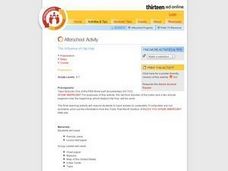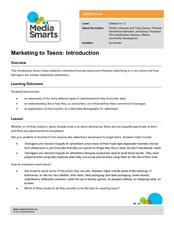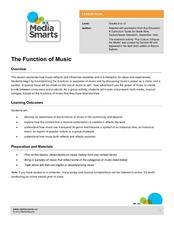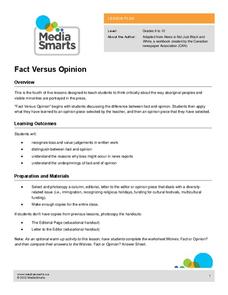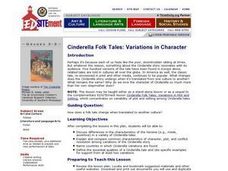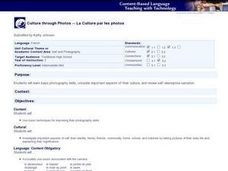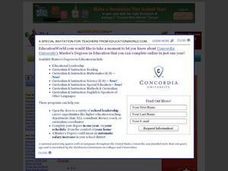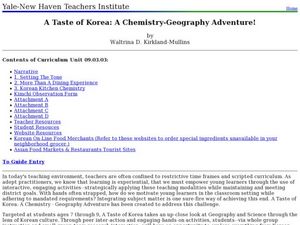Curated OER
The Countries of Latin America
Fifth graders study the geography, culture, government and economy of Latin American countries. They work in groups to fill out a profile describing their Latin American country. They listen to a reading of Latin American folktales and...
Curated OER
AZTEC TILES
Pupils observe the shapes and lines that make up Aztec sculpture, study Pre-Columbian art as they discover the Aztecs, Mayans and Incas. They create a small-scale Aztec tile using pasta. Creative, clever and engaging.
Media Smarts
Media Awareness Network: Hate or Debate?
Discuss the difference between legitimate debate on a political issue and arguments that are based on hate through a science-fiction scenario that shows how a controversial issue can be discussed in both ways. Then learn how purveyors of...
Curated OER
The Influence of Hip Hop
Young scholars consider the influence of Hip Hop on their own language use and various segments of American society; they reflect on and demonstrate their knowledge of Hip Hop vocabulary and its use.
Media Smarts
Gender Messages in Alcohol Advertising
Make your learners critical consumers of media, and foster an awareness of how culture is reflected and shaped by media. This resource covers how alcohol advertising presents and promotes gender stereotypes. After a discussion on...
Curated OER
Marketing to Teens: Introduction
An introductory lesson shows learners how pervasive and influential advertising is in our culture; particularly, how teenagers are actively targeted by advertisers. As teenagers, your students already have all the information they need...
Curated OER
Let's Plan a Trip!
Take a virtual trip to see other countries and cultures! After learning about different cultures and populations, English learners think about a place they'd like to visit. Small groups or individuals plan a trip to a country of their...
Curated OER
The Function of Music
Explore concepts of audience, purpose and symbols in this lesson from Media Smarts that asks young scholars to consider all the functions of music. Through a series of discussions and activities, your class will brainstorm possible...
Media Smarts
Fact versus Opinion
Part of a series aimed at breaking down cultural bias from the Canadian Media Awareness Network, this activity identifies where opinions do and don't belong in a newspaper. Pupils review handouts about the purpose of editorial comments...
Curated OER
Trip to an Art Gallery
Have your Spanish speakers give museum tours with this interactive plan. To simplify this entertaining idea, bring in art pieces and create a gallery in your very own classroom. Provide the names of different works of art and have your...
Curated OER
Character Nichos
This art lesson plan also incorporates a study Mexican and South American cultures and art. Learners then create Nichos, which are small, decorated boxes commonly found in homes and public places, or displayed on walls or pedestals.
Levin Institute
Unit on Culture and Globalization
Students explore the concept of cultural globalization. In this global issues lesson plan, students read and discuss the linked Web articles about world cultural issues and the dominance of the American market.
Curated OER
The Soundtrack of One's Life
Students research a historical person and the time in which he/she lived. They write a biography including images and at least four songs from the time period in which the person lived.
National Endowment for the Humanities
The World of Haiku
Students complete a study of Japanese culture through haiku. They read and interpret haiku poetry and write haiku of their own.
Curated OER
Cinderella Folk Tales: Variations in Character
Students read a variety of Cinderella tales from different cultures. They discuss the differences in character, plot, and conflict resolution in the stories from different countries.
Curated OER
Key Ingredients: America by Food
Students participate in a series of activities to explore the types of food Americans eat, how food choices differ in various parts of the country, and how the availability of various foods has changed over time.
Curated OER
Self and Photography
Eleventh graders, after investigating and studying self, family, friends, etc. by taking pictures of their daily life, assess basic photography skills that reflect aspects of their culture. They review those aspects and write a...
Curated OER
Masks
Students examine traditional masks from Southwest Indian groups and create their own mask based on Internet research. They share their mask with the members of their class.
Curated OER
A World of Special Celebrations
Brainstorm lists of celebrations with which your class are familiar. This lesson can be adapted to many different grade levels as they research ethnic and religious occasions/events celebrated by people around the world, and present...
Curated OER
Roman Gladiators
Young scholars review basic Latin terms pertaining to Roman gladitorial games, print out pictures of gladiators from Internet, share photos with classmates, choose gladiator to research, and prepare in depth visual and oral presentation...
Curated OER
A Taste of Korea: A Chemistry-Geography Adventure
Students explore the different aspects of Korean culture. In this geography instructional activity, students prepare different Korean dishes in the classroom. They create a visual display of things they learned about Korean culture.
Curated OER
Mexico: Culture, Language, and History
Study the culture, language, and history of Mexico in this collection of lessons. Create maps of Mexico's geography, study Spanish language phrases, and create a fiesta, along with a Mexican Marketplace scene.
National First Ladies' Library
See Those Golden Arches? Globalization and the History of McDonald's
Explore the idea of globalization and consider its effects using the history and expansion of McDonald's as an example. In addition, look at cultures that may be on their way to extinction.
Curated OER
Different Cultures Worksheet
In this social studies worksheet, students examine the statements made about ancient cultures and decide which aspect of culture is implied for the 6 questions.





